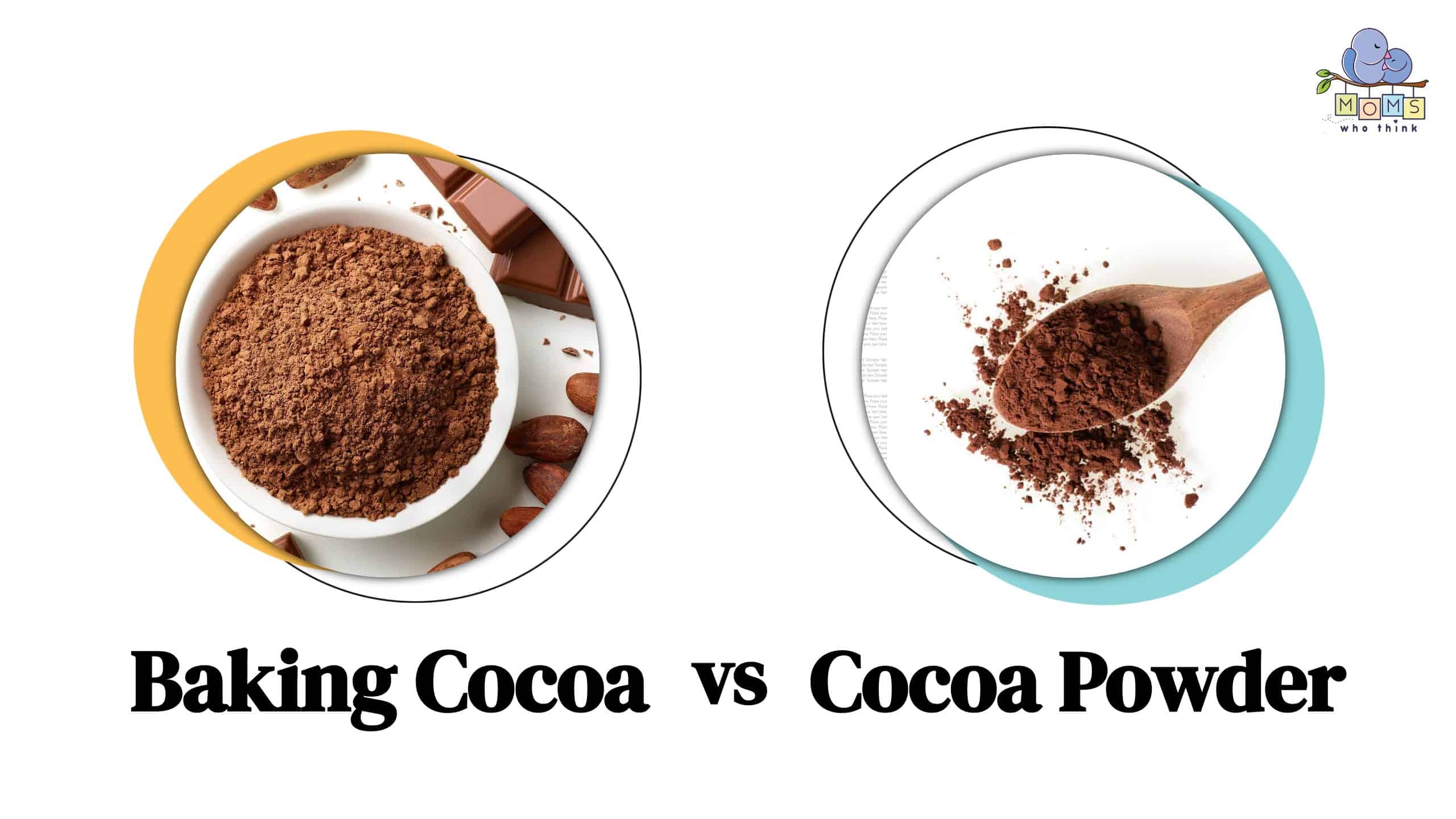Welcome to the wonderful world of baking with cocoa! Cocoa is a versatile ingredient that can be used in a variety of recipes, from cakes and cookies to hot cocoa and more. Cocoa powder is an essential part of any baker's pantry, offering deep, rich flavor and aroma that brings out the best in any dish. With a few simple steps, you'll be baking with cocoa and creating delicious treats in no time!
But first, let's find out the difference between baking cocoa and cocoa powder to help you make an informed decision for your next baking session.
Baking Cocoa vs. Cocoa Powder: What's the Difference?
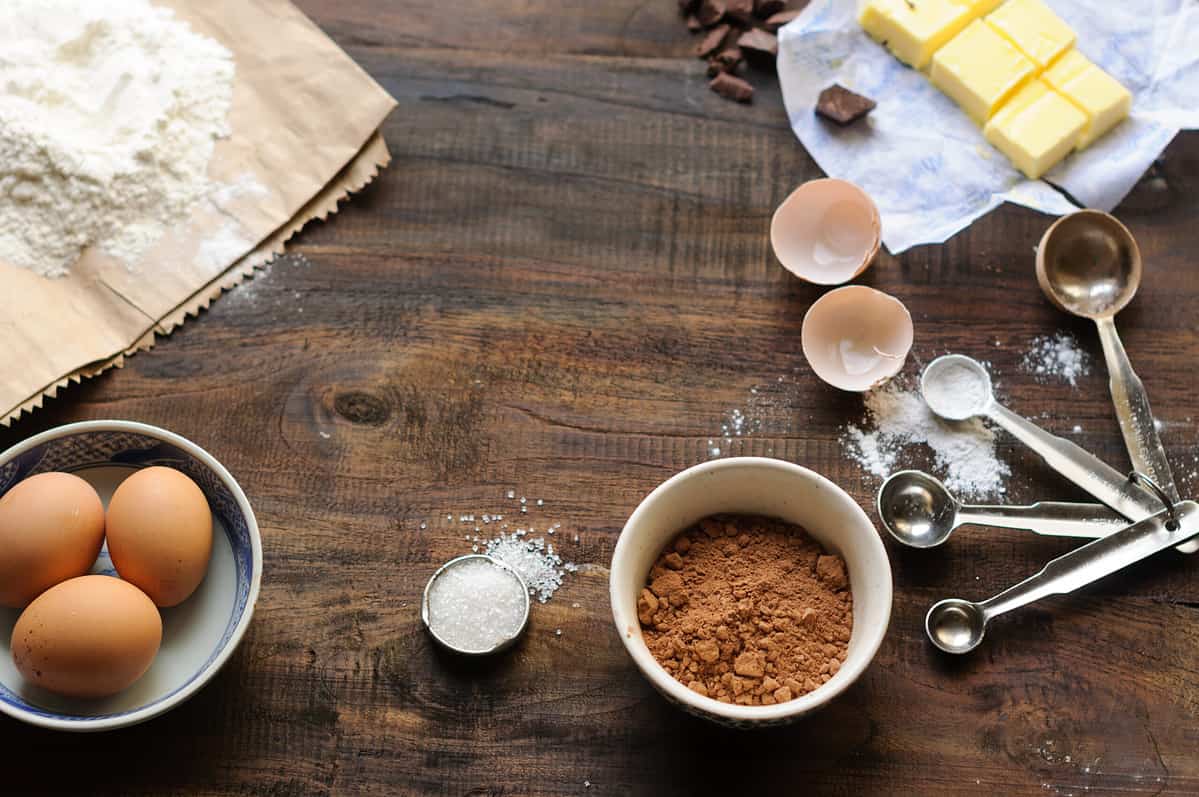
There is a noticeable difference when baking with baking cocoa and cocoa powder.
©anshu18/Shutterstock.com
The primary difference between baking cocoa and cocoa powder is that cocoa powder has been processed to have less acidity (Dutch-processing). This leads to cocoa powder having a milder flavor than baking cocoa, which is stronger and more bitter.
Now, it's important to note for the purpose of this article we'll use “baking cocoa” to refer to cocoa for baking that is natural. That is to say, it hasn't undergone the Dutch-processing to reduce its acidity. However, labeling on products can differ.
So when shopping for cocoa to add to desserts or drinks, keep in mind that you're looking for whether cocoa has been treated to change its pH from around 5 to a range closer 7 to 8. In this article, we'll refer to “cocoa powder” being alkalized, but you should check labels to make sure it says “Dutch-Process” or “Processed with Alkali”.
Likewise, a good recipe should clearly differentiate whether it's calling for cocoa that's gone through this process or not. Here are some key differences between cocoas that have been Dutch-processed or not.
Dutch Processed (Cocoa Powder in this article): Darker in color which gives baked goods a darker color. Used in recipes that call for baking powder. Has a milder flavor and is frequently used in recipes like hot chocolate and pudding.
Not Dutch Processed (Baking Cocoa in this article): Not treated with alkaline so has a pH of around 5, which is much more acidic. Used in recipes that call for baking soda as its higher acidity activates the leavening power of baking soda. Popular in truffles, desserts, cakes, and more.
What is Baking Cocoa?
Baking cocoa (or natural cocoa) is a chocolate used in baking recipes and desserts to add flavor and texture. It is crafted from roasted cocoa beans that can be ground into powder and contains more cocoa solids than ordinary cocoa powder.
Baking cocoa tastes more potent than cocoa powder that's been Dutch-processed, making it an ideal factor for including rich, chocolaty flavor in desserts. Additionally, baking cocoa has a plethora of health benefits due to its richness in vitamins and minerals.
Baking cocoa is high in antioxidants that defend cells from loose radical harm and may even help to decrease inflammation. It can also benefit your cardiovascular health because it includes flavonoids that reduce the risk of cardiovascular disease. Additionally, baking cocoa is high in minerals, including magnesium and iron, which assist in improving strength tiers and maintaining healthy bones.
Baking cocoa is normally utilized in baked items and cakes that require a rich chocolate taste. It may be used to make cakes, cookies, brownies, ice creams, fudges, and so much more. Baking cocoa is also brilliant for creating smooth, creamy chocolate frosting or ganache. Additionally, baking cocoa can be utilized in savory recipes to feature a sudden trace of chocolate taste.
What is Cocoa Powder?
Cocoa powder is the product of grinding and pressing cocoa beans which might be the seeds of cacao bushes. After harvesting from the cacao tree, the beans are fermented, dried, and roasted. This method allows for broadening cocoa’s unique taste and aroma. Once the cocoa beans are processed right into powder form, they end up as cocoa powder.
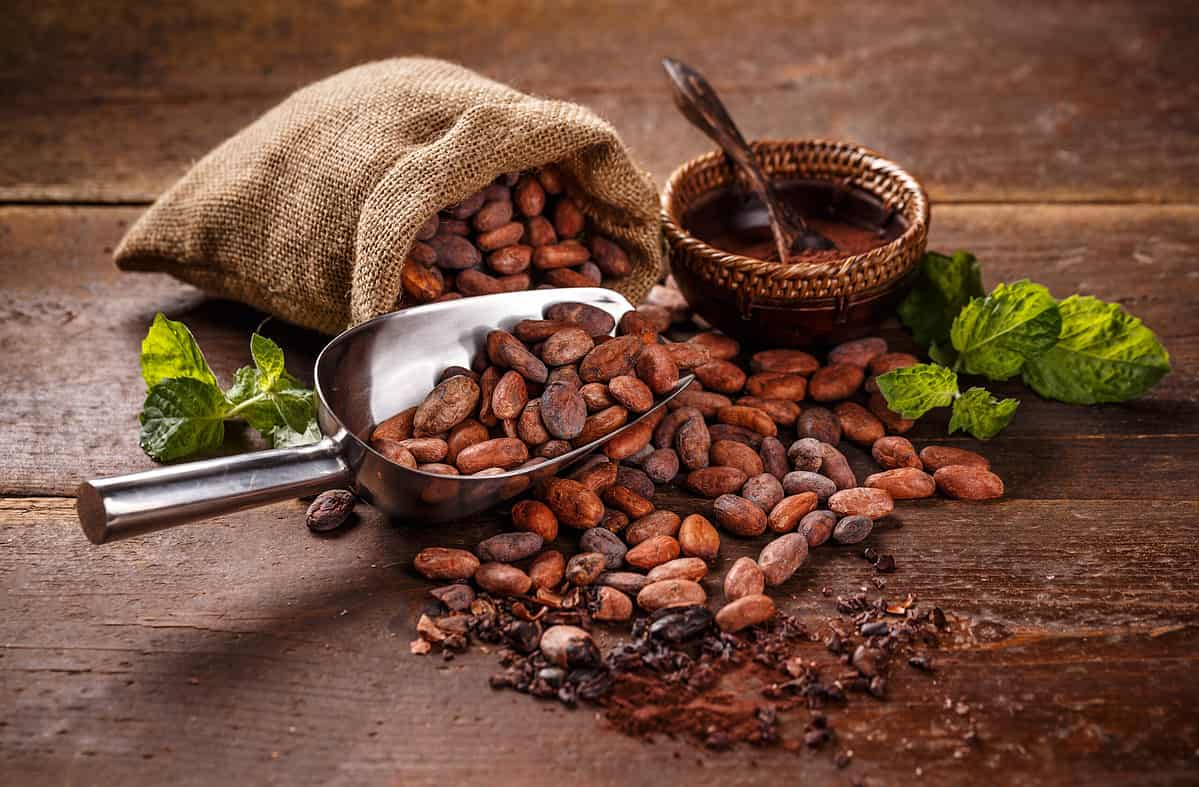
Cocoa beans are where it all starts with cocoa powder.
©grafvision/Shutterstock.com
Cocoa powder gives an impressive quantity of nutrients and antioxidants. It’s rich in magnesium, iron, zinc, copper, and potassium. Additionally, cocoa powder is full of flavonoids which are powerful antioxidants that can lessen infection and shield your cells from damage because of loose radicals. It can also assist in reducing blood pressure, improving cholesterol levels, and protecting against coronary heart ailments.
Cocoa powder is normally a flavoring agent in baking recipes like muffins and desserts. However, it may also be used to add spice and flavor to puddings, smoothies, espresso beverages, and hot chocolate. Cocoa powder is frequently used as a natural sweetener instead of sugar, adding a touch of sweetness without adding unnecessary calories.
Can You Substitute Baking Cocoa for Cocoa Powder?
As we noted earlier, it can be difficult to tell the difference between different cocoas. Recipes don't always specify whether they're using cocoa that's gone through the Dutch-process or not.
As such, the best advice is to use baking cocoa (natural cocoa) in recipes that use baking soda for leavening and cocoa powder (Dutch-processed) in recipes that call for baking powder.
Overall, while the two aren't directly interchangeable, if you're baking at home it's likely you'll still get good results even if you accidentally use the wrong cocoa in a recipe.
When used as a component in desserts, cookies, brownies, and other baked goods, baking cocoa (natural cocoa) adds a deep chocolate taste and a rich color to the completed product. It also helps to feature structure and balance to the batter.
Powdered cocoa (Dutch-processed cocoa powder) is generally used for more liquid recipes, including puddings, mousses, and sauces, as it contains a lot fewer fats than ordinary cocoa powder.
What Are Substitutes for Baking Cocoa?
Baking with cocoa can supply your recipes with a delicious, rich taste and an inviting aroma; however, now and again, substituting cocoa is important. Whether you’re out of cocoa or seeking something new to try, these superior substitutes for baking cocoa will surely make your cakes even more delightful.
Carob Powder
Carob powder is a cocoa substitute derived from the carob tree. It’s lower in fat and energy than cocoa. However, it has similar flavor notes and dark shades. Carob powder can be used to update an equal quantity of cocoa powder to your baking recipes or as a likely substitute for any recipe with melted chocolate or cocoa butter.
Unsweetened Chocolate
Unsweetened chocolate is largely natural cocoa, so it can be an exquisite substitute for baking cocoa in alternative recipes. When substituting unsweetened chocolate for cocoa powder, use three tablespoons of melted unsweetened chocolate as an alternative for each tablespoon of cocoa powder included in the recipe.
Coffee
If you don’t have cocoa powder or unsweetened chocolate, espresso can also be used as a substitute. When baking with espresso, use one to 2 tablespoons of the strong brewed coffee for each tablespoon of cocoa powder in the recipe. Adding espresso will give your cakes a unique, subtle taste and can also be used to deepen the chocolate notes in recipes.
Nut Butter
Nut butter, including almond or peanut butter, are super for adding a nutty, candy-like taste to your baked items when cocoa powder is unavailable. When using nut butter as an alternative to cocoa powder, use one tablespoon of nut butter for each tablespoon of cocoa powder. Depending on the kind of nut butter used, add extra sugar or honey to your recipe to stabilize the sweetness.
Unsweetened Applesauce
Using unsweetened applesauce as an alternative to baking cocoa is a way to make your cakes healthier. Applesauce is low in fat and energy, so it’s best for lightening up baked items. When substituting applesauce for cocoa powder, use a one-to-one ratio; however, be aware that it could increase the moisture of your recipe more than the cocoa could have.
What Are Substitutes for Cocoa Powder?
Cocoa powder is vital in many baked goods, desserts, and liquids. Here are several great substitutes for cocoa powder that could give the same rich taste to your recipes without spending a fortune;
Carob Powder
It's extracted from the dried pods of a Mediterranean evergreen tree and is an extremely outstanding alternative to cocoa powder. It has a soft, nutty taste and is regularly used as the less sweet alternative to chocolate.
Carob powder can be used to make cakes and warm drinks. Because it no longer includes caffeine or theobromine, carob powder is often used in recipes for little ones or those on special diets.
Instant Coffee Powder
You may be surprised to find that instant espresso powder can be used in place of cocoa powder in many recipes. Instant espresso has a sturdy, robust flavor and might help carry out chocolate's richness without overpowering it.
When using instant coffee powder instead of cocoa powder, add one tablespoon of cocoa for every teaspoon of instant coffee powder.
Nut Butter
Another splendid substitute for cocoa powder is nut butter. Nut butter, almond butter, peanut butter, and cashew butter are full of taste and may help add a unique twist to your baking recipes.
They also work exquisitely in smoothies and shakes for a creamy texture. Because nut butter is higher in fats than cocoa powder, you may need to reduce the level of oil or butter in your recipe to compensate.
Unsweetened Chocolate
Although unsweetened chocolate is a time-consuming substitute for cocoa powder, it produces terrific outcomes. Unsweetened baking chocolate consists of cocoa solids, which might offer chocolate its flavor and texture.
Soften the baking chocolate and add it to your recipe instead of the cocoa powder. Since unsweetened baking chocolate no longer comprises sugar, you can feature greater sweeteners in your recipe for a sweeter taste.
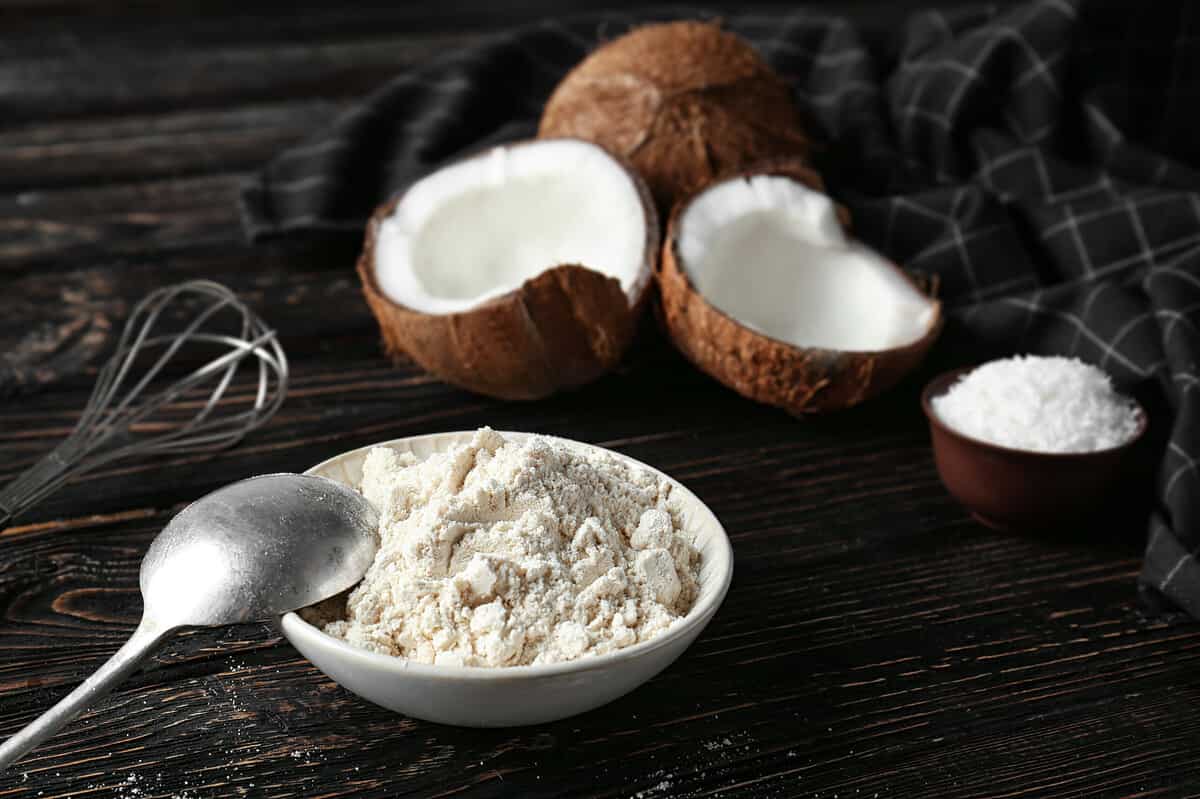
Coconut flour is an excellent substitute for cocoa powder.
©Africa Studio/Shutterstock.com
Coconut Flour
This is another splendid substitute for cocoa powder and works especially well in gluten-free recipes. Coconut flour provides a light, nutty flavor and can replace as much as a quarter of the cocoa powder in a recipe.
It is important to consider that coconut flour absorbs plenty greater moisture than cocoa powder, so you also need to modify the quantity of liquid in your recipe as nicely.
Baking Cocoa Recipes
Cocoa Powder Recipes
PrintCocoa Coffee Chicken with Salsa Mole
Ingredients
2 Tablespoons ground coffee
2 Tablespoons Hershey's unsweetened cocoa
1 Tablespoon salt
1 Tablespoon packed light brown sugar
1 teaspoon chili powder
4 boneless, skinless chicken breasts
1 Tablespoon vegetable oil
Salsa Mole Ingredients:
2 tomatoes, chopped
1 avocado, peeled and diced
1 green onion, minced
1 Tablespoon snipped cilantro
1 clove garlic, pressed
1/4 cup Hershey's Mini Chips Semi-Sweet Chocolate
1 teaspoon lime juice
Instructions
1. Heat oven to 425°F. Grease baking sheet.
2. Stir together coffee, cocoa, salt, brown sugar and chili powder.
3. Rub chicken pieces with vegetable oil; pat on cocoa mixture.
4. Place coated chicken pieces on prepared baking sheet.
5. Bake 20 to 25 minutes or until juices are clear.
6. While chicken is baking, prepare Salsa Mole and long grain white rice.
7. Heat 1 can black beans. Mix beans with rice.
6. When chicken is done baking, arrange chicken on a large platter. Spoon Salsa Mole on top.
Salsa Mole Instructions:
1. Stir together tomatoes, avocado, onion, cilantro, garlic, small chocolate chips and lime juice in medium bowl.
Conclusion
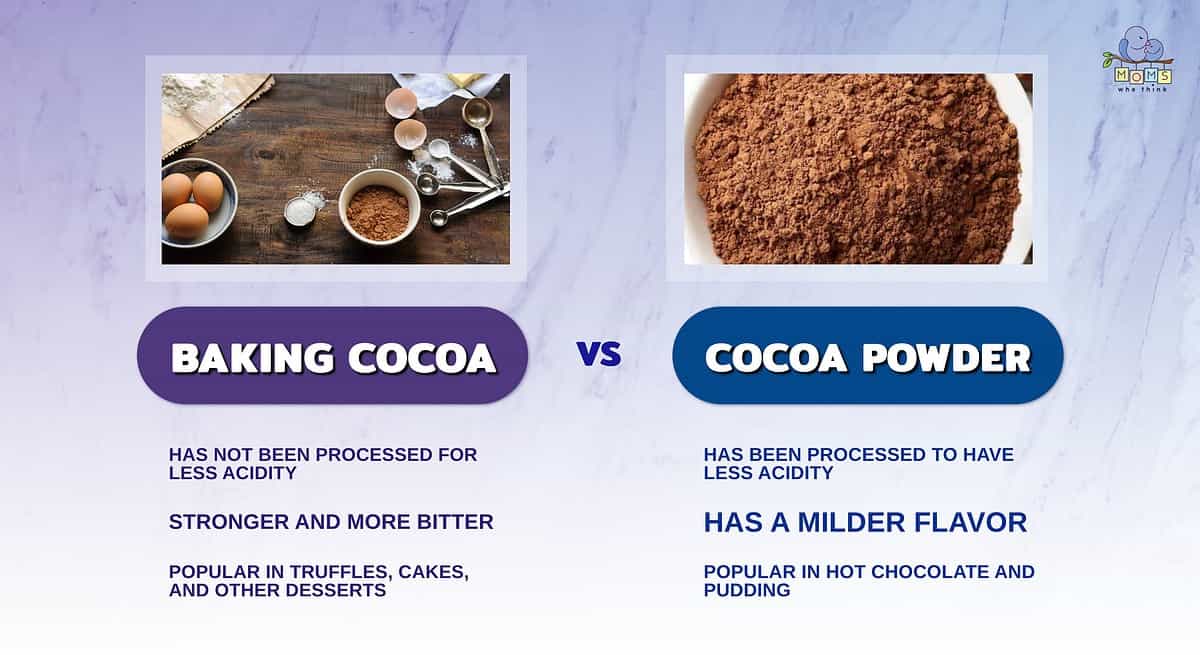
- One of the biggest differences between baking cocoa and cocoa powder is that cocoa powder has been processed to have less acidity.
- The processing that cocoa powder goes through means that it has a milder flavor. Some may feel that baking cocoa tastes bitter; one thing that's for certain is that it definitely tastes stronger than cocoa powder.
- Baking cocoa is popular in truffles, cakes, and other chocolate desserts. Meanwhile, cocoa powder is commonly used in hot chocolate and pudding.
In conclusion, it is essential to know the difference between baking cocoa and cocoa powder when baking. Depending on the recipe, you may need to select an unsweetened, natural, Dutch-processed, or even a mix of all three types for maximum flavor and texture. The quality of the ingredients used greatly affects the overall outcome and taste of the finished product. Therefore, knowing what to use between baking cocoa and cocoa powder when baking is essential for achieving perfect results every time.
